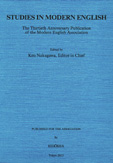新刊研究書 A List of New Books
近代英語協会創立30周年記念論文集 STUDIES IN MODERN ENGLISH
The Thirtieth Anniversary Publication of the Modern English Association
- 著者
- Ken Nakagawa, Editor in Chief
書籍内容 Contents
PREFACE Hiroshi Yonekura
SPECIAL CONTRIBUTIONS
Animals and Hunting in Lazamon's Brut
Jane Roberts
Variation in Negative Correlative Conjunctions in 18th-Century English
Terttu Nevalainen
On the Development of the Subjective and Discoursal Functions of By The Way
Minoji Akimoto
PART 1 MORPHOLOGY AND LEXIS
Anglicization of -able and Its Idiosyncrasies
Osamu Koma
Linguistic Differences Between the Hengwrt and Ellesmere Manuscripts of The Canterbury Tales: The Multifunctions of the Adjectival Final -e and the Scribe's Treatments
Yoshiyuki Nakao
Lexicalisation of Christianity, or Christianisation of the Anglo-Saxon Vocabulary
Michiko Ogura
Admire, Limb and Nasty in Frederick Marryat's A Diary in America
Motoko Sando
Meanings of the Word Grace in Late Middle and Early Modern English
Hiroshi Yonekura
PART 2 SYNTAX
Dynamic Change of Language Structure: Focusing on Word Order Change in the History of English
Michio Hosaka
The Which in Shakespeare Revisited
Shota Kikuchi
The Temporal Ago as a Postposition Superficially but as a Preposition Underlyingly
Fuminori Matsubara
Affirmative Imperative Do in Modern English: With Special Reference to Its Accelerators and Syntactic Patterns
Fujio Nakamura
Temporal Adverbs and the Downward Shift of Subjects in Middle English: A Pilot Study
Hiroyuki Nawata
Metrical Influences on Constructions with Complex Predicates in an Old English Long-Line Poem, Guthlac A
Hironori Suzuki
Complementation Pattern of Give Up and Its Synonymous Verbs in the Nineteenth and Twentieth Centuries
Harumi Tanabe
The Distribution of Verb-Object Order in the History of English:A Cyclic Linearization Approach
Tomoyuki Tanaka
PART 3 SEMANTICS, USAGE AND PRAGMATICS
On the Development of Pragmatic Let's Expressions
Tomohiro Kawabata
The Development of To Think Exclamatives: A Case Study of Insubordination
Mitsuru Maeda
Functions of The Thing Is in Spoken American English: With Its Origin and Development
Reijirou Shibasaki
Adverbial Date Expressions in Modern English
Satoshi Yamazaki
(Inter)subjectification and (Inter)subjective Uses of the Modal Can
Yoko Yonekura
PART 4 STYLlSTICS
Metadiscursive Practices for Guiding the Addressee from Middle to Modern English
Akio Katami
James Joyce's Free Indirect Thought and the Two Candles in Dubliners
Shigeo Kikuchi
Stylistic Use of Personal Pronouns in A Tale of Two Cities
Keisuke Koguchi
Multi-Layered Structure of Expression in The Prelude
Ken Nakagawa
Pronominal Shifts Between First and Third Person in Henry Esmond: Psychological Interactions Between Two Selves
Masayuki Nakao
Who vs. Whom in 19th-Century English Novels
Masami Nakayama
CONTRIBUTORS
MODERN ENGLlSH ASSOCIATION
